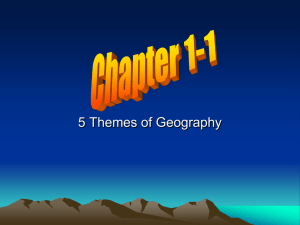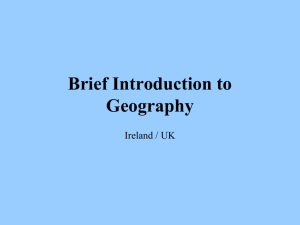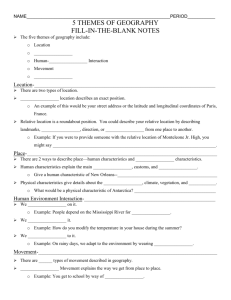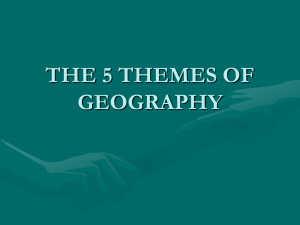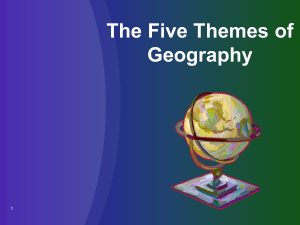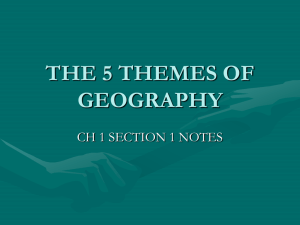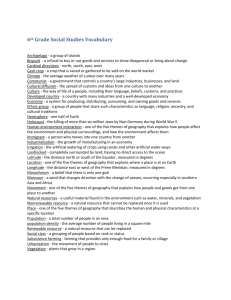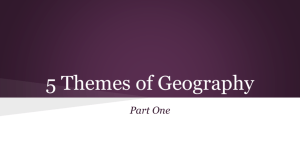Five Themes of Geography Presentation
advertisement
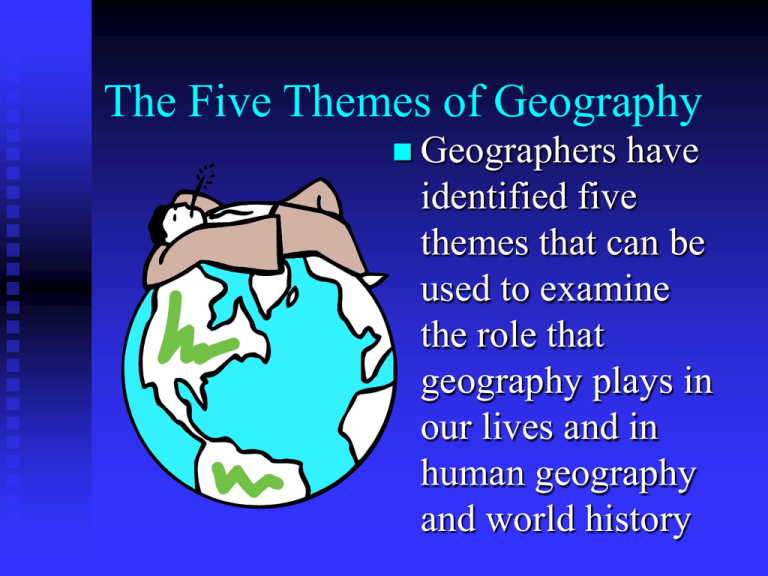
The Five Themes of Geography Geographers have identified five themes that can be used to examine the role that geography plays in our lives and in human geography and world history Location-serves as a starting point by asking, “Where is it?” To be more specific there are two types of location Absolute location refers to the exact location on the globe measured by latitude and longitude. Relative location is less precise. Relative location is where a place is in relation to somewhere else. Place refers to those features that give an area its own identity or personality. These can be: Physical characteristics-such as landforms,weather, plants,and animals Place Human characteristicslanguage,religion, architecture, music or politics Toponyms: The idea that place names reflect the culture and heritage of that place Places are commonly named after: Older places (New York, New Orleans, etc) Important People (Washington, Jefferson, San Francisco, etc) Characteristics of the place (Las Vegas (the meadows), Colorado, Rocky Mountains) History of the area/Native traditions and groups (Cheyenne, Kansas, Miami) Place This wall separated East Berlin from West Berlin from 1961 to 1990. How would the wall affect German’s “sense of place?” Human /Environment Interaction Human/Environment Interaction focuses on how people respond to and alter their environment. To live comfortably in many parts of the world, people must make changes to the environment, or adapt to conditions or both. How people choose to adapt to their areas depends on their attitudes to the natural setting, and the technology available to change it. Heavy monsoons flood the streets of India’s capital, New Delhi. How do the monsoons affect the life of people in India? Movement (Diffusion) The movement of people, ideas, and things between places means that events in other places of the world can have an impact on you personally Trains, ships, roads, airplanes link people throughout the world and products and people can be sent around the globe The movement of people is important because it can spread ideas, diseases, and culture from one place to another. Sometimes those ideas are accepted in the new location and the culture is changed Christian missionaries from America brought the game of baseball to Japan. What other ideas, products, or people have moved from one place to another? Region A region is an area that is unified by some feature or mix of features It is used to generalize about the Earth in physical or human terms. A culture region is one that shares a common history, culture, religion or language. Other regions could be economic, or political. The Middle East is an example of a region unified by a common language, Arabic. Three Types of Regions Formal (uniform or homogeneous) Regions have quantifiable characteristics in common have defined borders Examples: Colorado, the Bible Belt, Climate Regions Functional (nodal) Regions are defined by movement around a central hub Examples: TV Viewing Area, Airport Vernacular (perceptual) Regions Based on people’s perception of an area Different people have different perceptions (cultural identity) Examples: the South, East Coast Geography’s Impact on History and Humans While studying World History or Human Geography, you will be learning about the people, events and themes that have shaped the past. Keep in mind the themes and how they fashion the world in which we live. Five Themes of Geography Explain using examples how all the themes affect your way of life.
